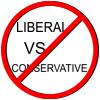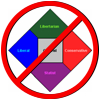|
American Patriot Party
Regarding
Voluntary Slavery
Part 2 of 3 on Slavery: Part 1 Slavery, Part 2 Voluntary Slavery, Part 3 Existance of Slavery.
The law regarding voluntary slavery is one that places a barrier between:
1.) those who would enslave if given the opportunity and
2.) those who are willing to be enslaved though fear, fraud or mistake.
Samuel Adams, Rights of the Colonists, 1772
"If men through fear, fraud or mistake, should "in terms" renounce and give up any essential natural right, the eternal law of reason and the great end of society, would absolutely vacate such renunciation; the right to freedom being the gift of God Almighty, it is not in the power of Man to alienate this gift, and voluntarily become a slave."
The first major barrier here, is that you cannot voluntarily give away, vote away or sell your essential natural rights or "freedom" in a free country; This is one freedom you do not have.
Secondly, you cannot accept others essential natural rights, even if they willingly and voluntarily attempt to relinquish them to you. This is another freedom you do not have.
This is voluntary slavery on the first instance, and the act of slavery on the second instance.
Thirdly, if there is a mutual agreement to give up each other's essential natural rights to each other, it is an act of slavery and voluntary slavery by both parties. This is another freedom you do not have.
Patrick Henry during the Constitutional Debates Presents the dangers present from slavery:
Virginia Ratifying Convention of the Constitution, MONDAY, June 16, 1788:
"... We are told, we are afraid to trust ourselves; that our own representatives Congress will not exercise their powers oppressively; that we shall not enslave ourselves; that the militia cannot enslave themselves. Who has enslaved France, Spain, Germany, Turkey, and other countries which groan under tyranny? They have been enslaved by the hands of their "own people". If it will be so in America, it will be only as it has been every where else...."
The Constitution of the United States:
Amendment XIII
[Proposed 1865; Ratified 1865]
Section. 1. Neither "slavery" nor "involuntary servitude", except as a punishment for crime whereof the party shall have been duly convicted, shall exist within the United States, or any place subject to their jurisdiction.
Section. 2. Congress shall have power to enforce this article by appropriate legislation.
---------
Voluntary Slavery is the least understood by Americans today, as the simple term "slavery" has fallen into a narrow historical definition of the past, and all but ignored as something that is as valid a concern today as it ever was.
In modern day, it's operation and meanings are hidden by obscurities of modern phrases that disarm and pacify.
To understand Voluntary Slavery one must understand completely the components of freedom.
These components are:
Essential Natural Rights
Essential Natural Rights are defined by what "nature and natures God entitle" each person - opening lines of the Declaration of Independence and also defined in the "Absolute Rights of the Colonists".
(Exert below - see link for entire rights which include 2d. The Rights of the Colonists as Christians-- 3d. The Rights of the Colonists as Subjects)
Rights of the Colonists: "The natural liberty of man is to be "free from" any superior power on earth, and not to be under the will or legislative authority of man; >>> but only to have the "law of nature" for his rule."
Nature and Natures God (as based upon Judeo - Christian) is established as the basis of all free law. These laws are defined and or obvious through "Natural reason and Equity".
Rights of the Colonists: "... All positive and civil laws, should conform as far as possible, to
the Law of natural reason and equity.--"
"... Just and true liberty, equal and impartial liberty" in matters spiritual and temporal, is a thing that all Men are clearly entitled to, by the eternal and immutable laws Of God and nature, as well as by the law of Nations, & all well grounded municipal laws, which "must" have their foundation in the former.--
"....Every natural Right not expressly given up or from the nature of a Social Compact "necessarily" ceded remains.--"
Absolute Rights of the Colonists, 1772:
1st. Natural Rights of the Colonists as Men.--
Among the Natural Rights of the Colonists are these
First. a Right to Life;
Secondly to Liberty;
thirdly to Property;
(Fourthly) together with the Right to support and defend them in the best manner they can--Those are evident Branches of, rather than deductions from the Duty of Self Preservation, commonly called the "first Law of Nature--"
All Men have a Right to remain in a State of Nature as long as they please: And in case of intolerable Oppression, Civil or Religious, (the right) to "leave the Society they belong to", and "enter into another".--
When Men enter into Society, it is by voluntary consent; and they have a right to demand and insist upon the performance of such conditions, And previous limitations as form an equitable original compact.--
Every natural Right not expressly given up or from the nature of a Social Compact "necessarily" ceded remains.--
All positive and civil laws, should conform as far as possible, to the Law of natural reason and equity.--
As neither reason requires, nor religion permits the contrary, every Man living in or out of a state of civil society, has a right peaceably and quietly to worship God according to the dictates of his conscience.--
"Just and true liberty, equal and impartial liberty" in matters spiritual and temporal, is a thing that all Men are clearly entitled to, by the eternal and immutable laws Of God and nature, as well as by the law of Nations, & all well grounded municipal laws, which "must" have their "foundation in the former".--
In regard to Religion, mutual toleration in the different professions thereof, is what all good and candid minds in all ages have ever practiced; and both by precept and example inculcated on mankind: And it is now generally agreed among Christians that this spirit of toleration in the fullest extent consistent with the being of civil society "is the chief characteristical mark of the true church"1 & In so much that Mr. Lock has asserted, and proved beyond the possibility of contradiction on any solid ground, that such toleration ought to be extended to all whose doctrines are not subversive of society. The only Sects which he thinks ought to be, and which by all wise laws are excluded from such toleration, are those who teach Doctrines subversive of the Civil Government under which they live. The Roman Catholics or Papists are excluded by reason of such Doctrines as these "that Princes excommunicated may be deposed, and those they call Heretics may be destroyed without mercy; besides their recognizing the Pope in so absolute a manner, in subversion of Government, by introducing as far as possible into the states, under whose protection they enjoy life, liberty and property, that solecism in politicks, Imperium in imperio 2 leading directly to the worst anarchy and confusion, civil discord, war and blood shed--
(APP Note: This last point with regard to religion of past practices of Roman Catholics or Papists, directly relates to modern radical Islamic religious practices)
The natural liberty of Men by entering into society is abridged or restrained so far only as is necessary for the Great end of Society the best good of the whole--
In the state of nature, every man is under God, Judge and sole Judge, of his "own" rights and the injuries done "him": By entering into society, he agrees to an Arbiter or indifferent Judge between him and his neighbors; but he "no more renounces his original right," than by taking a cause out of the ordinary course of law, and leaving the decision to Referees or indifferent Arbitrations. In the last case he must pay the Referees for time and trouble; he should be also willing to pay his Just quota for the support of government, the law and constitution; the end of which is to furnish indifferent and impartial Judges in all cases that may happen, whether civil ecclesiastical, marine or military.--
"The natural liberty of man is to be "free from" any superior power on earth, and not to be under the will or legislative authority of man; but only to have the "law of nature" for his rule."--
In the state of nature men may as the Patriarchs did, employ hired servants for the defense of their lives, liberty and property: and they should pay them reasonable wages. Government was instituted for the purposes of common defense; and those who hold the reins of government have an equitable natural right to an honorable support from the same principle "that the laborer is worthy of his hire" but then the same community which they serve, ought to be assessors of their pay: Governors have no right to seek what they please; by this, instead of being content with the station assigned them, that of honorable servants of the society, they would soon become Absolute masters, Despots, and Tyrants. Hence as a private man has a right to say, what wages he will give in his private affairs, so has a Community to determine what they will give and grant of their Substance, for the Administration of public affairs. And in both cases more are ready generally to offer their Service at the proposed and stipulated price, than are able and willing to perform their duty.--
In short it is the greatest absurdity to suppose it in the power of one or any number of men at the entering into society, to renounce their essential natural rights, or the means of preserving those rights when the great end of civil government from the very nature of its institution is for the support, protection and defense of those very rights: the principal of which as is before observed, are life liberty and property. If men through fear, fraud or mistake, should in terms renounce and give up any essential natural right, the eternal law of reason and the great end of society, would absolutely vacate such renunciation; the [Volume 5, Page 396] right to freedom being the gift of God Almighty, it is not in the power of Man to alienate this gift, and voluntarily become a slave--
-----------------
Here it is clear that what nature entitles you establishes what you are entitled.
You are not entitled however to give those essential natural rights up to voluntarily become a slave.
Voluntary Slavery
The issues of voluntary slavery cover areas of:
1.) Obvious slavery against ones will but by which a person accepts slavery of himself to another by and through fear of harm to himself, or fear for harm to others. This fear of harm can include physical, living conditions, incarceration, blackmail or financial. Also known as Involuntary Servitude.
2.) Voluntary Slavery through the practice of usury, where through fear, fraud or willing mistake, a person inters into agreements that financially bind him without hope of resolve.
a.) Usury is when individuals, institutions or government step outside the laws of reason and equity. Interest beyond 8% has long since been established as usury; (Rights of the Colonists: All positive and civil laws, should conform as far as possible, to the Law of natural reason and equity.--)
b.) As well as taxes taken without ones consent (17th Grievance of the Declaration of Independence which defines taxation without ones consent as one of the definitions of a tyrannical government). or
c.) Taxes taken beyond this percentage. or
d.) Taxes taken arbitrarily. Rights of the Colonists: "The Legislative has no right to absolute arbitrary power over the lives and fortunes of the people..." "The Legislative cannot Justly assume to itself a power to rule by extempore arbitrary decrees; but it is bound to see that Justice is dispensed, and that the rights of the subjects be decided, by promulgated, standing and known laws, and authorized independent Judges;"
e.) Property taken without consent, but through imposing condemnation laws for which a person pressed into compliance. Rights of the Colonists: "The supreme power cannot Justly take from any man, any part of his property without his consent, in person or by his Representative.--"
f.) In Morality, voluntary slavery occurs where one person accepts relinquishment of entitled natural rights of nature and or entitled rights of God by another person; or mutual relinquishment of each others natural and or God given rights. (Rights of the Colonists: All positive and civil laws, should conform as far as possible, to the Law of "natural reason and equity".--)
Patrick Henry, Founder of Freedom: "Bad men cannot make good citizens. It is when a people forget God that tyrants forge their chains. A vitiated state of morals, a corrupted public conscience, IS INCOMPATIBLE WITH FREEDOM.
No free government, or the blessings of liberty, can be preserved to any people but by a firm adherence to justice, moderation, temperance, frugality, and virtue; and by a frequent recurrence to FUNDAMENTAL PRINCIPLES."
Rights of the Colonists: "The natural liberty of man is to be "free from" any superior power on earth, and not to be under the will or legislative authority of man; >>> but only to have the "law of nature" for his rule."
Nature and Natures God (as based upon Judeo - Christian) is established as the basis of all free law. These laws are defined and or obvious through "Natural reason and Equity".
Rights of the Colonists: "... All positive and civil laws, should conform as far as possible, to
the Law of natural reason and equity.--"
"... Just and true liberty, equal and impartial liberty" in matters spiritual and temporal, is a thing that all Men are clearly entitled to, by the eternal and immutable laws Of God and nature, as well as by the law of Nations, & all well grounded municipal laws, which "must" have their foundation in the former.--
"....Every natural Right not expressly given up or from the nature of a Social Compact "necessarily" ceded remains.--"
Law of Promulgated, Standing and Known Laws
Rights of the Colonists: Every natural Right not expressly given up or from the nature of a Social Compact "necessarily" ceded remains.--
Constitution:
Amendment IX: The enumeration in the Constitution, of certain rights, shall not be construed to deny or disparage others retained by the people.
Amendment X: The powers not delegated to the United States by the Constitution, nor prohibited by it to the States, are reserved to the States respectively, or to the people.
Intent of Powers and Rights Defined and Reserved during the Constitutional Debates:
Virginia Ratifying Convention of the Constitution, MONDAY, June 16, 1788:
(See our 2006 News Letter that lists this debate.)
Mr. Marshall:
He then concluded by observing, that the power of governing the militia was not vested in the states by implication, because, being >>>possessed of it antecedent to the adoption of the government, and >>>not being divested of it by any grant or restriction in the Constitution, they must necessarily be as >>>fully possessed of it as ever they had been. And it could not be said that the states derived any powers from that system, >>>but retained them, though not acknowledged in any part of it.
George Mason:
"...That Congress should have power to provide for the general welfare of the Union, I grant. But I wish a clause in the Constitution, with respect to all powers which are not granted, that they are retained by the states. Otherwise, the power of providing for the general welfare may be perverted to its destruction.
Many gentlemen, whom I respect, take different sides of this question. We wish this amendment to be introduced, to remove our apprehensions. There was a clause in the Confederation reserving to the states respectively every power, jurisdiction, and right, not expressly delegated to the United States. This clause has never been complained of, but approved by all Why not, then, have a similar clause in this Constitution, in which it is the more indispensably necessary than in the Confederation, because of the great augmentation of power vested in the former? In my humble apprehension, unless there be some such clear and finite expression, this clause now under consideration will go to any thing our rulers may think proper. Unless there be some express declaration that every thing not given is retained, it will be carried to any power Congress may please.
Patrick Henry:
"... At the revolution, it must be admitted that it was their sense to set down those great rights which ought, in all countries, to be held inviolable and sacred. Virginia did so, we all remember. She made a compact to reserve, expressly, certain rights.
George Nicholas:
"... It is agreed upon by all that the people have all power. If they part with any of it, is it necessary to declare that they retain the rest? Liken it to any similar case. If I have one thousand acres of land, and I grant five hundred acres of it, must I declare that I retain the other five hundred? Do I grant the whole thousand acres, when I grant five hundred, unless I declare that the five hundred I do not give belong to me still? It is so in this case. After granting some powers, the rest must "remain with the people".
|



















